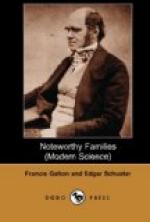I cannot speak from the present returns, but only from my own private knowledge of the somewhat abnormal frequency with which eccentricity, or other mental unsoundness, occurs in the families of very able scientific men. Lombroso, as is well known, strongly asserted the truth of this fact, but more strongly, as it seems to myself, than the evidence warrants.
It is, therefore, not in the highest examples of human genius that heredity can be most profitably studied, men of high, but not of the highest, ability being more suitable. The only objection to their use is that their names are, for the most part, unfamiliar to the public.
The vastness of the social world is very imperfectly grasped by its several members, the large majority of the numerous persons who have been eminent above their far more numerous fellows, each in his own special department, being unknown to the generality. The merits of such men can be justly appreciated only by reference to records of their achievements. Let no reader be so conceited as to believe his present ignorance of a particular person to be a proof that the person in question does not merit the title of noteworthy.
I said what I have to say about the modern use of the word “genius” in the preface to the second edition of my “Hereditary Genius.” It has only latterly lost its old and usual meaning, which is preserved in the term of an “ingenious” artisan, and has come to be applied to something akin to inspiration. This simply means, as I suppose, though some may think differently, that the powers of unconscious work possessed by the brain are abnormally developed in them. The heredity of these powers has not, I believe, been as yet especially studied. It is strange that more attention has not been given until recently to unconscious brain-work, because it is by far the most potent factor in mental operations. Few people, when in rapid conversation, have the slightest idea of the particular form which a sentence will assume into which they have hurriedly plunged, yet through the guidance of unconscious cerebration it develops itself grammatically and harmoniously. I write on good authority in asserting that the best speaking and writing is that which seems to flow automatically shaped out of a full mind.




